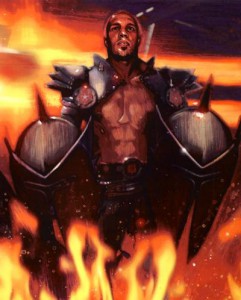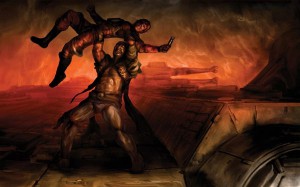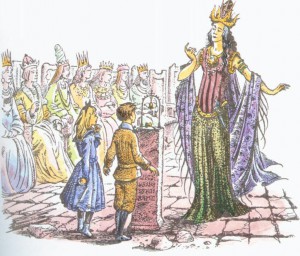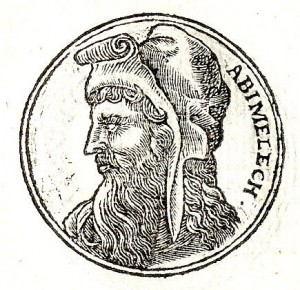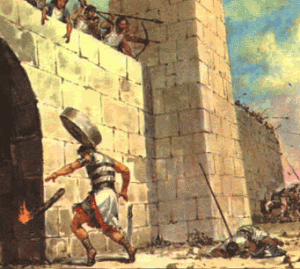Concluding the post-Exilic history books, Esther is the account of a young woman who shows great courage as she risks everything to save her people from genocide.
June 29, 2012
As I begin the look of Esther, I’d like to review a few facts about the book: 1) it is an account of the Jews who didn’t return from exile, 2) it serves as a sort of interlude between Ezra and Nehemiah, and 3) in theme, it visits Israel’s past in an account of the events written in its present.
Starting with chapter 1, Zerubabbel’s reconstruction has been going on for some time (from Cyrus through Darius’s reign), and now we come to the early years of Ahasuerus, otherwise known as Xerxes I. In secular history, one of his most notable contributions was the attempted invasion of Greece; his predecessor Darius retreated following the battle of Marathon (the present-day race named for the Greek runner who carried the message of victory), and Xerxes made his own attempt, reaching much farther but ultimately failing due to the alliance between Athens, Sparta, and the other Greek city-states.
The first feast, it is theorized, was an ongoing, conference to discuss strategy and supply for the invasion of Greece, with the second as a sort of wrap-up party to help Xerxes and the advisors relax. A possible reason for this is that the former lasted nearly half a year, while the latter extended for only a week. During this time, Xerxes is mentioned to be showing off everything he possessed; this might be viewed as a propaganda move, with the Persian monarch reviewing his ability to finance the war and giving his generals a chance to indulge themselves before entering into the field of battle.
In the following week-long celebration, it was an all male affair; the men and women were each given separate quarters in which they celebrated. It was during this time that Xerxes made a lapse in judgment, foolishly attempting to display his wife, Queen Vashti, as a trophy alongside the possessions he had until now been displaying. Her refusal is understandable; she responded in a manner indicating that, although he was a king, Xerxes would not be allowed to treat his wife in a way that undermined human dignity. Being either drunk or hung over, Xerxes was furious that he would be refused in such a way, and under advisement from his ministers (who controlled access to the king) issued a decree that effectively exiled Vashti for life, intending to make her an example to all women under Persian rule, whatever their station.
As a tangent, I would note that it was one man’s idea to exile Vashti – Memucan, to be precise. He is the last of the ministers named, perhaps indicating his youth (a similar pattern exists in Job, with Job’s friends Eliphaz, Bildad, and Zophar). For whatever reason, his is the only suggestion noted, perhaps due to the fact that it was the one that impressed the king and fellow ministers and was carried out in the end.
The gap between the first two chapters can perhaps be explained by the war in Persia, following which he turned his attention back to the affairs of the Persian empire and his own household affairs. Having had time to calm down, Xerxes no doubt regretted having banished his queen, but due to the nature of the Persian monarchy, even the king could not reverse the law. In essence, the Persians had a dash of republic in their kingdom, as even the king was subject to the law, unlike the Babylonians who preceded them; thus, Xerses could never see Vashti again.
To bring the monarch out of his slump, an idea was conceived by his servants; they thought that the best way to get over an old, bad relationship was to start a new, fresh one (big surprise, right?). Young, unmarried women from all over the Persian empire were brought to the capital in a sort of “Bachelor” event. They would undergo (this is amazing) a WHOLE YEAR of beauty treatments, perhaps to bring out their maximum appeal as women, then each one would spend one night with the king as candidates to replace Vashti as queen. Whoever failed would join the harem (having been with the king) and unless the king was pleased with her, the woman would never see the king – or any other man – again. Pretty raw deal, wouldn’t you say, ladies? ☹
Upon this note, we are introduced to two key people in the events to follow: Mordecai, a minor functionary at the palace, and his younger cousin Hadassah, whose Persian name is Esther. Mordecai is the great-grandson of one of Jerusalem’s exiles, and Esther has been raised by him since childhood. She is described as a lovely, beautiful woman, and that I believe goes beyond her appearance; for a woman to be truly beautiful, she must be of godly character, and Esther will demonstrate this time and again.
After being claimed for Xerxes’ beauty pageant, Esther is taken to the palace, but she and Mordecai remain in touch due to his position. She trusts and obeys her cousin, treating him as her father-figure, despite the circumstances of her recently elevated status. She continues to act humbly throughout her year of preparation, making no requests for worldly possessions beyond what was recommended for her. It was these traits, I think, that made her stand out to Xerxes among all the young women at his disposal; while GOD is never mentioned directly in the text, we can have no doubt that He was moving in and through events and people. His grace and guiding hand allowed Esther to move into a position that will later on allow her to influence events all over her known world.
Following the acceptance of Esther as queen, Mordecai becomes witness to a plot by two of Xerxes’ bodyguards. These two, known as Bigthan and Teresh, plan to either take the monarch hostage or eliminate him altogether; it’s unclear if they are doing this out of personal spite or if another person was bribing them to do so. Regardless, Mordecai alerts Esther, who informs the king on behalf of her cousin, although Xerxes is unaware of their connection; in order to safeguard her national identity, Mordecai instructs her to hide it, even from the king. The plot is revealed, the two would-be aggressors are executed, and the whole thing is recorded in the annals of Persia, with Mordecai’s part in the matter clearly noted.




